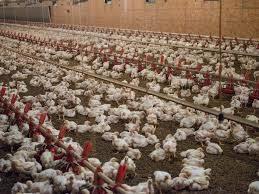 Contracts determining payment and conditions of association for growers were apparently changed concurrently with the announcement of the acquisition of Sanderson Farms by a consortium comprising Cargill Inc. and Continental Grain Company. This transaction merged the third ranked U.S. broiler producer with the Wayne Farms segment of Continental Grain, resulting in some overlaps in areas of operation. Faced with opposition from contractors in Mississippi, Sanderson Farms withdrew the proposed contract and issued an alternative on August 19th.
Contracts determining payment and conditions of association for growers were apparently changed concurrently with the announcement of the acquisition of Sanderson Farms by a consortium comprising Cargill Inc. and Continental Grain Company. This transaction merged the third ranked U.S. broiler producer with the Wayne Farms segment of Continental Grain, resulting in some overlaps in areas of operation. Faced with opposition from contractors in Mississippi, Sanderson Farms withdrew the proposed contract and issued an alternative on August 19th.
Sanderson Farms has restructured marketing programs including form of product and packaging in response to changes in retail and institutional demand attributed to COVID restrictions. The changes that were proposed, although appearing to represent a short-term cut were effectively neutral with respect to annual income given increased volume and shorter down-time between flocks in response to the demand for lower live weight mainly for tray-pack products.
 With the merger of Wayne Farms and Sanderson Farms, many growers felt that they had fewer or in some cases no alternative options available and accordingly formed the Mississippi Poultry Growers Alliance. The group requested a retraction of the apparent pay cut, increased transparency and an end to the tournament system. It is indeed unfortunate that the precipitate but understandable actions by Sanderson Farms were regarded as a cut in pay. The intentions of the company were obviously inappropriately communicated to growers and the timing only intensified the underlying concerns and insecurity of growers.
With the merger of Wayne Farms and Sanderson Farms, many growers felt that they had fewer or in some cases no alternative options available and accordingly formed the Mississippi Poultry Growers Alliance. The group requested a retraction of the apparent pay cut, increased transparency and an end to the tournament system. It is indeed unfortunate that the precipitate but understandable actions by Sanderson Farms were regarded as a cut in pay. The intentions of the company were obviously inappropriately communicated to growers and the timing only intensified the underlying concerns and insecurity of growers.
The situation that has yet to be resolved will be the subject of Congressional inquiry with Senators representing Midwest states producing beef and pork questioning concentration in red meat packing. Despite the fact that Sanderson Farms issued a written explanation on September 17th, an advocacy organization, the Rural Advancement Foundation International addressed a letter to the Department of Justice Antitrust Division on behalf of poultry growers in the State of Mississippi outlining the issues in contention. Growers in contiguous counties with only one integrator are obviously at a disadvantage with respect to their ability to bargain. Once having taken on the burden of long-term loans, they are obviously obliged to work with a single integrator to maintain cash flow. In most counties in the U.S. major integrators are working harmoniously with growers to their mutual benefit. In recent years where expansion of production has required recruitment of growers for pullet rearing, hatching-egg production and grow-out, applicants for contracts exceed demand attesting to the inherent equity of the contract system.
Recent action in Washington involving both the Senate Judiciary Sub-Committee on Antitrust and the Senate Agriculture Committee are reminiscent of the joint Department of Justice and Department of Agriculture hearings on supply chains and contracts that led to new rules under the Packers and Stockyards Act. The testimony of aggrieved contractors formed the basis of new rules issued in January 2017 by the then and now, current Secretary of Agriculture Tom Vilsack. Although rescinded by Secretary of Agriculture Dr. Sonny Perdue in 2017, the draft of the Rule is still on the desk of Secretary Vilsack. There is growing sentiment in Congress opposing consolidation, size and scope of integrators and even foreign ownership of enterprises.
Given the prevailing climate chicken integrators should be extremely careful to work collaboratively with contractors and to exercise fairness in their interactions to avoid litigation and possible onerous new rules and restrictive legislation. The contract system has worked to the benefit of all for decades and should continue albeit with appropriate recognition of the need for security and profit for both sides of the transaction. More transparency, adjustments of conditions where necessary, mutual respect and understanding will all contribute to continuation of the system. This will be to the mutual benefit of integrators and contractors and ultimately consumers.